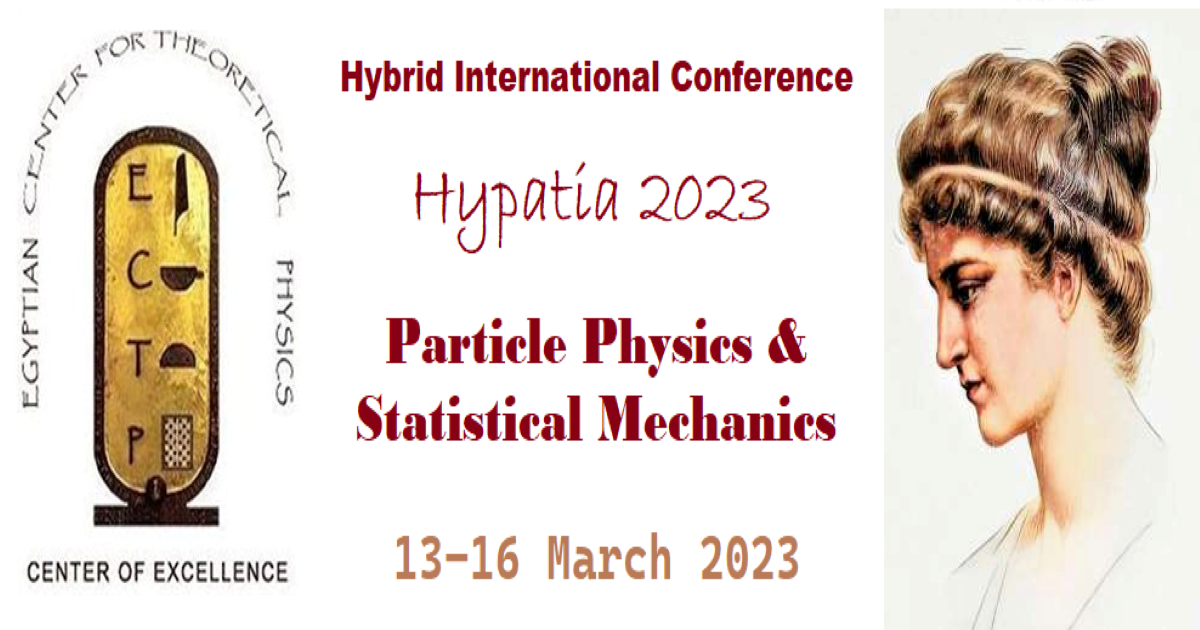- 2.2Impact Factor
- 5.3CiteScore
- 16 daysTime to First Decision
Hypatia 2023–Particle Physics and Statistical Mechanics
This special issue belongs to the section “Physics“.
Special Issue Information
Dear Colleagues,
In honoring Hypatia of Alexandria (c.370CE-c.415CE), the Hellennistic Neoplatonist Mathematician, Astronomer, and Philosopher, the Egyptian Center for Theoretical Physics (ECTP) organizes this International Conference. The first edition of this conference is devoted to "Particle Physics and Statistical Mechanics". Thereby, the participation for female as well as other minority groups of scientists and researchers is especially promoted.
Hypatia was the daughter of the last great mathematician Theon of Alexandrea (c.335CE-c.405CE), who also tutored her in mathematics, astronomy, and philosophy. Hypatia was well known for her lectures and public outreach. She was admired because of her work on the ideas of conic sections introduced by Apollonious, especially how she divided cones into different parts by a plane. From this concept, the ideas of hyperbolas, parabolas, and ellipses were born. She mastered making related concepts easier to understand, even in ancient times. Hypatia never married. She was the first female scientist to whom such a profound mathematical impact was attributed.
The topics represented at Hypatia 2023 are categorized into five interconnected disciplines:
- Particle Physics including Nuclear Experiments, Phenomenological Studies, Theoretical Approaches, Simulations, Perturbative/Nonperturbative QCD, Hydrodynamics, Thermal Models, Standard Model, Beyond Standard Model, etc.
- Statistical Mechanics including Applied/Abstract Mathematics, Thermodynamics, Extensive/Nonextensive Statistics, Superstatistics, etc.
- Geometry Analysis including Euclidean Geometry, Gauge Theory, Differential Geometry, Finsler/Rieman Geometry, etc.
- Astronomy including General Relativity, Gravitation, Quantum Gravity, Black Holes, Singularities, Physics of Early Universe, Gravitational Wave Astronomy, Ultra-High-Energy Cosmic Rays, Particle Astrophysics, etc.
- Outreach and Public Talks: Science History, Science Philosophy, etc.
Prof. Dr. Abdel Nasser Tawfik
Guest Editor
Manuscript Submission Information
Manuscripts should be submitted online at www.mdpi.com by registering and logging in to this website. Once you are registered, click here to go to the submission form. Manuscripts can be submitted until the deadline. All submissions that pass pre-check are peer-reviewed. Accepted papers will be published continuously in the journal (as soon as accepted) and will be listed together on the special issue website. Research articles, review articles as well as short communications are invited. For planned papers, a title and short abstract (about 250 words) can be sent to the Editorial Office for assessment.
Submitted manuscripts should not have been published previously, nor be under consideration for publication elsewhere (except conference proceedings papers). All manuscripts are thoroughly refereed through a single-blind peer-review process. A guide for authors and other relevant information for submission of manuscripts is available on the Instructions for Authors page. Symmetry is an international peer-reviewed open access monthly journal published by MDPI.
Please visit the Instructions for Authors page before submitting a manuscript. The Article Processing Charge (APC) for publication in this open access journal is 2400 CHF (Swiss Francs). Submitted papers should be well formatted and use good English. Authors may use MDPI's English editing service prior to publication or during author revisions.

Benefits of Publishing in a Special Issue
- Ease of navigation: Grouping papers by topic helps scholars navigate broad scope journals more efficiently.
- Greater discoverability: Special Issues support the reach and impact of scientific research. Articles in Special Issues are more discoverable and cited more frequently.
- Expansion of research network: Special Issues facilitate connections among authors, fostering scientific collaborations.
- External promotion: Articles in Special Issues are often promoted through the journal's social media, increasing their visibility.
- Reprint: MDPI Books provides the opportunity to republish successful Special Issues in book format, both online and in print.


